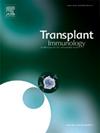糖尿病患者的肺移植:一项系统综述。
IF 1.4
4区 医学
Q4 IMMUNOLOGY
引用次数: 0
摘要
背景和目的:肺移植(LTx)越来越多地在世界范围内进行,但移植后生存率仍然低于其他实体器官。糖尿病(DM)在LTx接受者中很常见,并影响预后。本系统综述评估了糖尿病对LTx结局的影响以及糖尿病发病时间对生存的影响。方法:于2024年12月对PubMed、Scopus和Web of Science进行系统检索,以确定涉及移植前糖尿病患者接受或等待LTx的原始研究或病例系列。纳入研究的质量采用非随机研究方法学指数(Methodological Index for non - random studies,未成年人)进行评估。结果:纳入了1992年至2024年间发表的84项研究,样本量从10万到400多万患者不等,随访时间为1至25 年。8- 56%的肺移植受者存在糖尿病 %。糖尿病患者,包括既往糖尿病、囊性纤维化相关糖尿病(CFRD)和移植后新发糖尿病(NODAT),感染、急性肾损伤、血栓栓塞事件、慢性同种异体肺功能障碍和心血管并发症的风险更高。糖尿病始终与增加的短期和长期死亡率、延长的机械通气时间和更高的住院率相关。结论:糖尿病——无论是在肺移植前出现还是在肺移植后发生——是不良临床结果和死亡率的重要预测因子。这些发现强调了围手术期谨慎的血糖管理、量身定制的免疫抑制和警惕监测以减少并发症的必要性。进一步标准化的前瞻性研究对于指导最佳糖尿病管理和提高肺移植受者的生存率至关重要。本文章由计算机程序翻译,如有差异,请以英文原文为准。
Lung transplantation in patients with diabetes: A systematic review
Background and aim
Lung transplantation (LTx) is increasingly performed worldwide, yet post-transplant survival remains lower than for other solid organs. Diabetes mellitus (DM) is common among LTx recipients and impacts outcomes. This systematic review evaluates the effects of DM on LTx outcomes and the influence of diabetes onset timing on survival.
Methods
A systematic search was conducted in December 2024 across PubMed, Scopus, and Web of Science to identify original studies or case series involving patients with pre-transplant DM undergoing or waitlisted for LTx. The quality of the included studies was assessed using the Methodological Index for Non-Randomized Studies (MINORS).
Results
Eighty-four studies published between 1992 and 2024 were included, with sample sizes ranging from 10 to over 4 million patients and follow-up from 1 to 25 years. Diabetes was present in 8–56 % of lung transplant recipients. Patients with diabetes, including pre-existing diabetes, cystic fibrosis-related diabetes (CFRD), and new-onset diabetes after transplantation (NODAT), showed higher risks of infections, acute kidney injury, thromboembolic events, chronic lung allograft dysfunction, and cardiovascular complications. Diabetes was consistently associated with increased short- and long-term mortality, prolonged mechanical ventilation, and greater hospitalization rates.
Conclusion
Diabetes—whether present before or developing after lung transplantation—is a significant predictor of adverse clinical outcomes and mortality. These findings underscore the need for careful perioperative glycemic management, tailored immunosuppression, and vigilant monitoring to reduce complications. Further standardized, prospective research is essential to guide optimal diabetes management and improve survival in lung transplant recipients.
求助全文
通过发布文献求助,成功后即可免费获取论文全文。
去求助
来源期刊

Transplant immunology
医学-免疫学
CiteScore
2.10
自引率
13.30%
发文量
198
审稿时长
48 days
期刊介绍:
Transplant Immunology will publish up-to-date information on all aspects of the broad field it encompasses. The journal will be directed at (basic) scientists, tissue typers, transplant physicians and surgeons, and research and data on all immunological aspects of organ-, tissue- and (haematopoietic) stem cell transplantation are of potential interest to the readers of Transplant Immunology. Original papers, Review articles and Hypotheses will be considered for publication and submitted manuscripts will be rapidly peer-reviewed and published. They will be judged on the basis of scientific merit, originality, timeliness and quality.
 求助内容:
求助内容: 应助结果提醒方式:
应助结果提醒方式:


